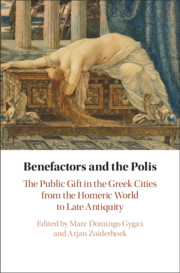 Benefactors and the Polis
Benefactors and the Polis Book contents
- Benefactors and the Polis
- Benefactors and the Polis
- Copyright page
- Contents
- Figures
- Tables
- Contributors
- Acknowledgements
- Abbreviations
- Introduction
- Part I Benefiting the Community in Early Greece
- Part II Classical Benefactors
- Part III Hellenistic Benefactors
- Part IV Benefactors and the Polis under Rome
- Chapter 8 Emperors, Benefaction and Honorific Practice in the Roman Imperial Greek Polis
- Chapter 9 Benefactors and the Poleis in the Roman Empire
- Chapter 10 Festivals and Benefactors
- Part V The Decline and Fall of Euergetism?
- Conclusion
- Index
- Index locorum
- References
Chapter 9 - Benefactors and the Poleis in the Roman Empire
Civic Munificence in the Roman East in the Context of the Longue Durée
from Part IV - Benefactors and the Polis under Rome
Published online by Cambridge University Press: 21 January 2021
- Benefactors and the Polis
- Benefactors and the Polis
- Copyright page
- Contents
- Figures
- Tables
- Contributors
- Acknowledgements
- Abbreviations
- Introduction
- Part I Benefiting the Community in Early Greece
- Part II Classical Benefactors
- Part III Hellenistic Benefactors
- Part IV Benefactors and the Polis under Rome
- Chapter 8 Emperors, Benefaction and Honorific Practice in the Roman Imperial Greek Polis
- Chapter 9 Benefactors and the Poleis in the Roman Empire
- Chapter 10 Festivals and Benefactors
- Part V The Decline and Fall of Euergetism?
- Conclusion
- Index
- Index locorum
- References
Summary
In this chapter the author identifies the chief continuities and changes in civic munificence in the poleis under Roman imperial rule in comparison with the previous periods of Greek history. To do so, the author develops a model to answer the question of why elite public giving was a such an enduring element of polis society in the first place. He identifies three structural features of polis society that can explain the centrality of elite public giving: the specific way wealth, fame, power and authority needed to be legitimated in the polis; the particularity of the Greeks’ idea of politics; and the stateless character of the polis. To test this model, the author then applies it to explain two specific characteristics of civic euergetism in the Greek cities under the Roman empire, namely, its unprecedented proliferation during the first, second and early third centuries CE, and the extent to which munificence started to transcend the benefactor’s own civic community, that is, the increasing tendency of benefactors to include non-citizen groups in the poleis in their munificence as well as to give to cities other than their own.
Keywords
- Type
- Chapter
- Information
- Benefactors and the PolisThe Public Gift in the Greek Cities from the Homeric World to Late Antiquity, pp. 222 - 242Publisher: Cambridge University PressPrint publication year: 2021
References
- 3
- Cited by
